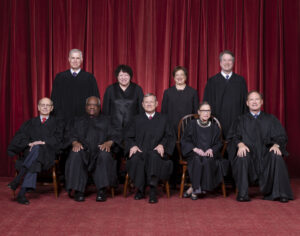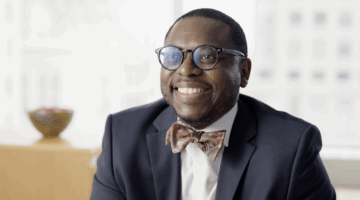
(Photo by Fred Schilling, Supreme Court Curator’s Office).
Back in the primaries, Joe Biden promised that his first Supreme Court appointee would be a black woman. At the time, this came across as a nod to Kamala Harris supporters. She offered a deep record as a prosecutor, occupied a safe Senate seat, and gave Biden a splashy candidate to tease. The last California politician appointed to the Supreme Court (who also took a turn as the VP nominee incidentally) turned out pretty well. But then Biden went and added her to the ticket leaving his pledge without an obvious match. So now what’s he planning to do?
Because, hey, people actually care about the Supreme Court this time around. What a time to be alive!

How Legisway Helps In-House Teams Manage All Legal Matters In One Trusted Place
Operate with AI driven insights, legal intake, unified content and modular scalability to transform efficiency and clarity.
The attention on Harris as a potential nominee always felt a little awkward — as if people were just jumping on the idea with the highest profile black woman in politics out of a lack of imagination — but it actually underscored exactly how terrible Democrats have been at building a roster of Supreme Court contenders. At least the floating of Harris read less patronizing than “Michelle Obama because… she was a lawyer, right?”
Actually, Michelle Obama is a pretty decent avatar for the historic problem Biden faces. America already mints far too few attorneys of color and if a black woman manages to enter the workforce with a Harvard law degree, the opportunity to make bank in Biglaw or parlay it into a $200K+ in-house job will push many off the traditional path to the bench. Simply put, the private sector understands the importance of diversity and is willing to pay people to build it (at least on paper… how genuine and lasting these efforts are is a subject for another post). A few years ago, Judge Posner wrote about the perverse economics that rewards talented legal minds to go anywhere but the courts. Judging is fundamentally a position that relies on people having the privilege to take less money to do a harder job.
Perusing the Circuit Courts, the Supreme Court farm system, turns up no black women under the age of 69 (or, at least, will be in a couple of weeks). They would be excellent justices but we have a completely broken Supreme Court model artificially biased against age and experience that rewards presidents of both parties for choosing the youngest possible credible nominees in order to maximize their impact from beyond their political graves. Where’s the Rule Against Perpetuities for judicial nominations?
With appellate judges off the table and Harris planning her office layout at the Naval Observatory, the nomination process enters relatively unfamiliar territory. Though not entirely unprecedented. Justice O’Connor was a state court appellate judge when Reagan tapped her to replace Potter Stewart. In some ways, Biden faces the same landscape Reagan did in 1981 when he searched for someone to fulfill his promise to put the first woman on the Court.

How The Law Office Of Stephen L. Thomas Jr. Reclaimed Valuable Hours And Strengthened Client Care With 8am
Founded in 2017, the Baltimore-based Law Office of Stephen L. Thomas Jr. unified case management, communication, and payments with 8am—saving 10–20 hours a week for clients, trials, and growth.
So what about the state courts? I asked Richmond Law’s judicial nomination guru Professor Carl Tobias and he said a lot of attention is focused on California Supreme Court Justice Leondra Kruger. A Yale Law grad who clerked for Justice Stevens and served as acting principal deputy solicitor general during the Obama administration. With six years on the California high court, she has ample judicial experience for the job and her relatively moderate record would make it difficult for Republicans to brand her as a dangerous radical — though they managed to turn Merrick F**king Garland into Che Guevara, so who knows? At 44, she’s right in the sweet spot for nomination.
Beyond the state courts there’s always the rare double-A call-up of picking directly from the district courts. If this is the route, Judge Ketanji Brown Jackson would seem the most likely option. Judge Jackson was already vetted for Garland’s nomination so the Biden camp wouldn’t be starting from scratch. A Harvard Law grad who clerked for Breyer, Judge Jackson brings experience as a federal defender to the mix on top of her seven years of experience on the federal bench within the D.C. Circuit footprint. That said, her position has also landed her in some hot button disputes, notably the Don McGahn subpoena case, that might make her a target for aggrieved Republicans if they were to maintain control of the Senate.
So maybe this comes down to “who wins the Senate?” Judge Jackson if the Democrats don’t have to deal and Justice Kruger if they need to get Mitt Romney to jump aboard?
Professor Tobias identified some constituencies for candidates outside the judiciary. The lack of experience on the bench make them definite longshots because, unfortunately, we’ve created a very narrow path to the high court that crowds out diverse career perspectives. Professor Michelle Alexander, author of The New Jim Crow (affiliate link), would be a monumental pick after an election that saw Black Lives Matter achieve widespread appeal. But, with Trump having successfully baited the Democrats into a “law & order” message complete with all the baggage that carries, it might be safe to say Biden’s not the guy who’ll push the envelope here. Sherrilyn Ifill, the president of the NAACP Legal Defense Fund, which is the role that brought us the nation’s first black justice Thurgood Marshall, though Marshall had spent time on the Second Circuit and in the Justice Department before getting the nomination. Professor Melissa Murray of NYU Law would bring academic heft to the job but would also make for an awkward conference room since she notably testified against Brett Kavanaugh’s nomination. And since we kicked this off with a politician lawyer, Stacey Abrams is a Yale Law grad and Keisha Lance Bottoms served as a judge before becoming mayor of Atlanta — both of whom were reportedly considered in Biden’s running mate process. Letitia James is New York’s Attorney General and has made headlines pursuing Trump-related misconduct too.
A lot of intriguing possibilities, but if you’re a gambling person, Kruger and Jackson are definitely the favorites. Regardless of what happens, more important than placing a black woman on the Supreme Court will be recruiting more future candidates to take the plunge and opt for a career in the judiciary.
 Joe Patrice is a senior editor at Above the Law and co-host of Thinking Like A Lawyer. Feel free to email any tips, questions, or comments. Follow him on Twitter if you’re interested in law, politics, and a healthy dose of college sports news. Joe also serves as a Managing Director at RPN Executive Search.
Joe Patrice is a senior editor at Above the Law and co-host of Thinking Like A Lawyer. Feel free to email any tips, questions, or comments. Follow him on Twitter if you’re interested in law, politics, and a healthy dose of college sports news. Joe also serves as a Managing Director at RPN Executive Search.